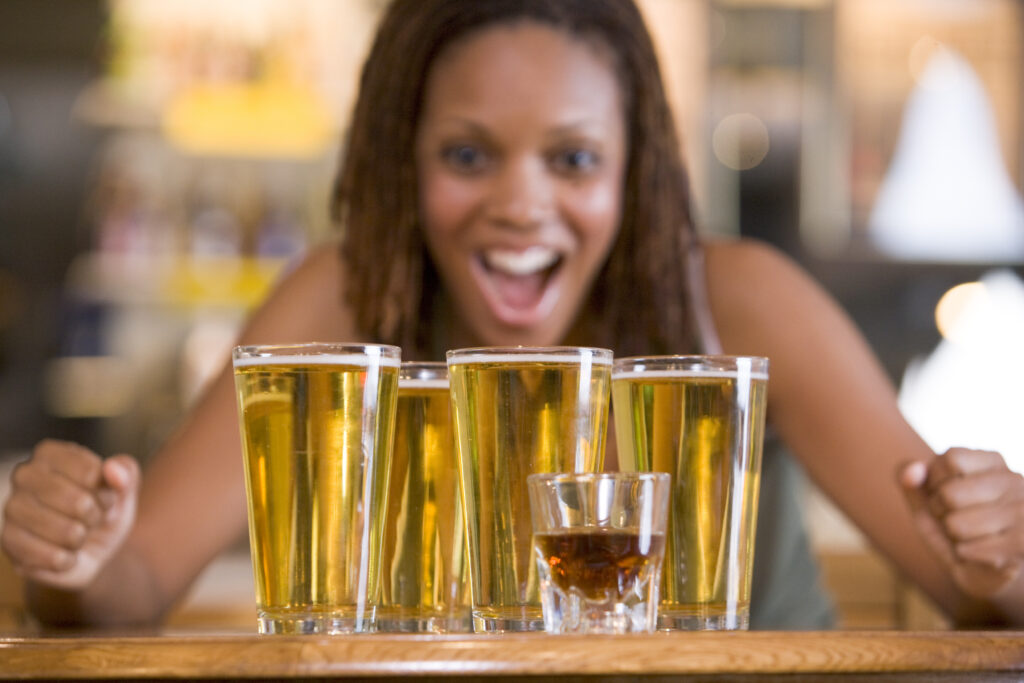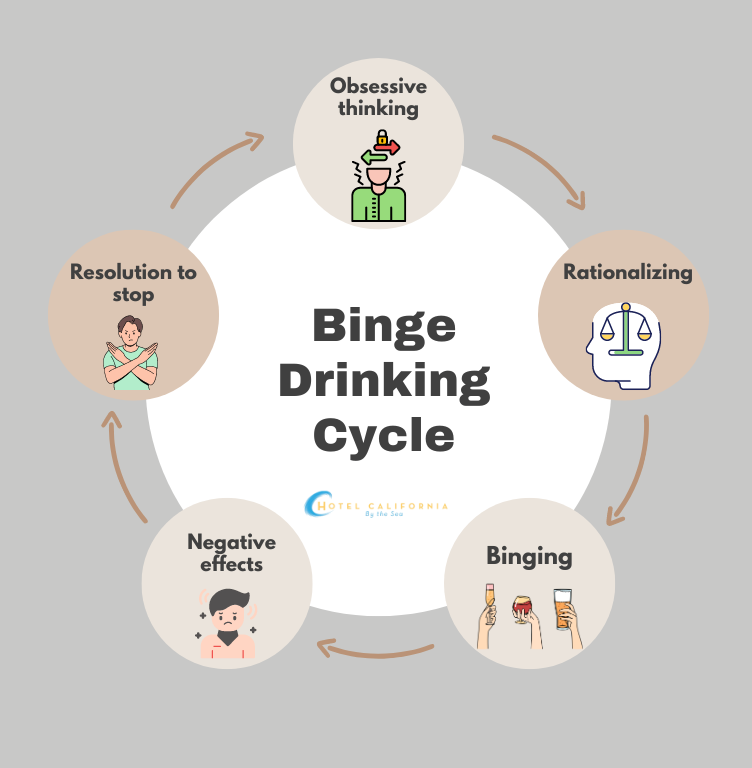How to Stop Binge Drinking
Is binge drinking a precursor for alcohol abuse? Is binge drinking a form of alcohol abuse? Binge drinking is defined as a pattern of excessive drinking described as short, but heavy bursts of alcohol use. When consuming such large amounts of alcohol within a short period of time, it can raise the blood alcohol content (BAC) level to the legal limit of intoxication or higher. According to the National Institute of Alcohol Abuse and Alcoholism (NIAAA), binge drinking is a destructive pattern of drinking alcoholic beverages that brings the BAC to 0.08% or higher.

Binge drinking is the most common in young adults ages 18-34. It is also more common in men and for people who have higher household incomes. For men, five or more drinks within two hours is considered binge drinking. For women, four or more drinks within two hours is considered binge drinking. Binge drinking is a serious but preventable public health issue. The NIAAA reports that an estimated 26.45% of U.S. adults reported binge drinking in the past month. An estimated 1 out of 6 U.S. adults reported binge drinking with about 25% of these adults binge drinking on a weekly basis.
What is the difference between binge drinking and heavy drinking?
Heavy drinking and binge drinking are not one in the same. Heavy drinking involves lots of drinking that is spread out over a period of time. This may be days or weeks. Binge drinking involves lots of drinking within a very short amount of time. An example of binge drinking would be consuming five or more drinks in two hours. An example of heavy drinking would be consuming five or more drinks per day or more than 14 drinks per week.
In a 2010 study, the research found that excessive drinking, including binge drinking, cost the U.S. nearly $249 billion in lost work productivity, health care expenditures due to excessive drinking and criminal justice costs resulting from excessive drinking. Binge drinking specifically accounted for about 77% of the costs. Binge drinking puts an unnecessary drain on the U.S. economy.

How do you know if you are binge drinking?
Most people who binge drink often do not realize it is problematic or that they have a problem. Oftentimes, people binge drink because of feelings of stress, boredom, lack of awareness of their personal alcohol tolerance, social anxiety and peer pressures.
Binge drinking doesn’t necessarily mean you may have an alcohol dependence or addiction. Only an estimated 10% of people who binge drink struggle with alcohol abuse. Binge drinking on occasion does not mean you have an alcohol use disorder. Binge drinking is considered a behavior and not a mental health condition. According to the CDC, 90% of people who participate in excessive drinking do not meet the criteria for alcohol use disorder. However, binge drinking on a regular basis can raise the risk of developing alcohol abuse. A 2020 study of young adults found binge drinking almost doubles the risk of alcohol-associated consequences compared to non-binge drinking patterns.
What are some of the signs to look for if you have a binge drinking problem? You may drink more than you intended. You might have a difficult time cutting yourself off once you start drinking. You frequently experience alcohol-induced blackouts. You often feel guilt and shame for how much you drank and sometimes what you did while under the influence. Your mental health conditions may get worse. You might also begin to engage in reckless behaviors and activities.
Risks and side effects of Binge Drinking
- Chronic physical conditions. Binge drinking and excessive drinking can lead to conditions such as cardiovascular disease, high blood pressure, heart disease and stroke. Other conditions such as digestive issues, ulcers and liver disease are also heightened.
- Cancer. Binge drinking damages body tissue and interferes with normal body functions including the ability to absorb nutrients and vitamins needed to break down harmful chemicals and protect from disease. Users are at risk for liver cancer, esophageal cancer, colon cancer and breast cancer.
- Weight gain. Many alcoholic beverages contain lots of calories and sugar, which can lead to weight gain.
- Impaired cognitive functions. Excessive drinking can lead to alcohol-induced blackouts, lapses in memory, impaired judgment and impedes the ability to store short-term information. It can also affect verbal learning skills, decision-making skills and the ability to pay attention.
- Impulsivity. A person who binge drinks can have a more difficult time controlling impulsivity, which can lead to reckless and dangerous behaviors.
- Alcohol poisoning or overdose. When the levels of alcohol in your bloodstream are so high, it can reduce heart rate, breathing, and body temperature and cause seizures and loss of consciousness. This becomes a life-threatening situation and emergency care is needed.
- Mental health conditions. Binge drinking can lead to worsening symptoms of anxiety, depression and sleep disorders such as insomnia.
- Mental confusion
- Feeling cold and clammy
- Nausea and vomiting
Check Your Insurance Coverage for FREE
Find out if your insurance covers addiction treatment in minutes. We accept most insurance!
How to Stop Binge Drinking
- Keep track of how much you are drinking. Count and measure.
- Change your drinking to alcohol-free beverages such as mocktails or soda. Try and alternate between an alcoholic drink and a regular beverage.
- Set a hard limit on how much you drink.
- Drink plenty of water.
- Take smaller sips of your drink.
- Set out a goal to learn how to handle drinking urges and decline offers to drink.
- Avoid triggers such as people and places that tempt you to drink.
- Find and drink with someone who can keep you accountable and will support you to not drink.
- Seek out alternative activities and fill your time with a new hobby such as exercising, hiking, reading and arts.
- Build new social circles and surround yourself with new people who do not trigger you to drink.
- Communicate your boundaries so you can learn to say no to alcohol.
- Ask for support or find support in programs such as AA or SMART Recovery.
- Drink with food.
- Try medication management with naltrexone. Naltrexone can prevent alcohol from producing its euphoric feelings and block the endorphin receptors in the brain which makes drinking less pleasurable.
Reach out to Hotel California by the Sea
We specialize in treating addiction and other co-occurring disorders, such as PTSD. Our Admissions specialists are available to walk you through the best options for treating your addiction.
Treatment for binge drinking and alcohol addiction
Binge drinking has become a popular form of excessive drinking. It affects populations of all ages. While binge drinking is not a form of alcohol abuse, over time, it can lead to negative consequences, a dependence on alcohol, and alcohol use disorder. Alcohol use disorder is one of the most common mental health conditions worldwide. It can be a difficult disease to overcome. Professional behavioral health programs such as Hotel California by the Sea provide effective and supported alcohol recovery treatments to help clients in all stages of the disorder.
The alcohol use disorder treatment program provides care in detox, residential, PHP and IOP services. We also specialize in treating co-occurring mental health disorders. With evidence-based treatments such as CBT, DBT and group therapy, clients will be able to understand the underlying causes of their addiction and mental health issues. Hotel California by the Sea’s goal is to help clients learn to manage their condition, gain back their independence and live a happier and healthier life in sobriety.
References:
https://www.bayfronthealth.com/content-hub/6-tips-to-stop-binge-drinking
https://riahealth.com/blog/how-to-stop-binge-drinking-tips
https://www.verywellmind.com/reasons-to-stop-binge-drinking-66595
https://www.healthline.com/health/alcohol/binge-drinking-vs-alcoholism
https://www.medicalnewstoday.com/articles/binge-drinking-definition
https://www.helpguide.org/articles/addictions/binge-drinking.htm
